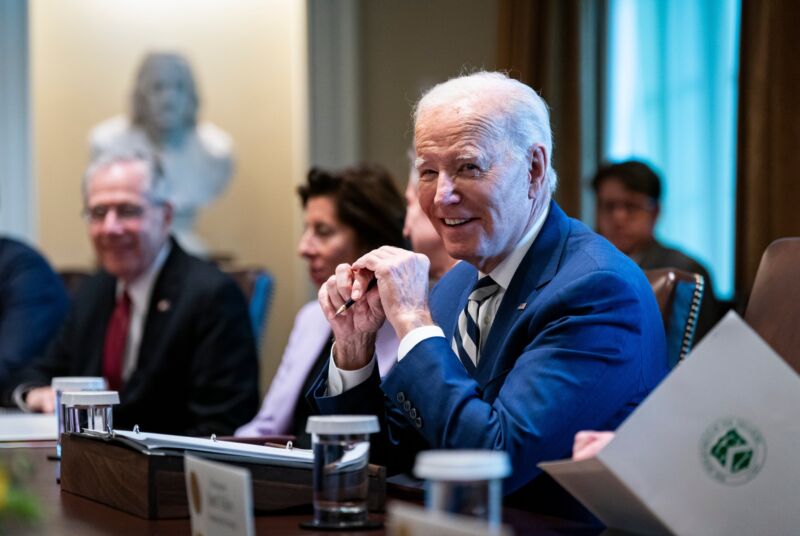
Getty Images | Bloomberg
The Supreme Court has blocked an injunction that would prevent the Biden administration from pressuring social media firms to take down content. Justices agreed to hear the Biden administration’s appeal of the injunction, which will be stayed until the high court issues a ruling that could either uphold the injunction or block it permanently.
The decision to grant the stay and hear the administration’s appeal was issued in an order Friday. The court previously issued a temporary stay while it considered whether to hear the case, so the injunction has not been enforced.
Justices Samuel Alito, Clarence Thomas, and Neil Gorsuch dissented, arguing that the stay “allows the defendants to persist in committing the type of First Amendment violations that the lower courts identified. The majority takes this action in the face of the lower courts’ detailed findings of fact.”
The case began with the Missouri and Louisiana attorneys general suing the Biden administration in US District Court for the Western District of Louisiana, alleging that the government violated the First Amendment by colluding with social networks “to suppress disfavored speakers, viewpoints, and content.” US District Judge Terry Doughty, a Trump nominee, issued a sweeping injunction ordering the administration to halt a wide range of communications with social media companies.
Most of the injunction was overturned by a ruling from the US Court of Appeals for the 5th Circuit. But the appeals court also ruled that the White House and FBI likely violated the First Amendment by coercing social media platforms into moderating content and changing their moderation policies.
The appeals court issued a modified version of the injunction that said the Biden administration “shall take no actions, formal or informal, directly or indirectly, to coerce or significantly encourage social-media companies to remove, delete, suppress, or reduce, including through altering their algorithms, posted social-media content containing protected free speech.”
AG alleges “vast censorship enterprise”
After the Biden administration’s stay application was granted Friday, Missouri Attorney General Andrew Bailey wrote that state officials “look forward to dismantling Joe Biden’s vast censorship enterprise at the nation’s highest court.” Bailey has previously called the Biden administration’s alleged coercion of social media firms “the worst First Amendment violations in this nation’s history.”
When the Biden administration asked the Supreme Court to block the injunction, it argued that its attempts to influence content moderation were persuasion, not coercion. Government officials were “urging platforms to remove COVID-19 misinformation, highlighting the risk of disinformation from foreign actors, and responding to the platforms’ inquiries about matters of public health,” the Biden administration said.
The Biden administration also told the Supreme Court that the injunction “imposed unprecedented limits on the ability of the President’s closest aides to use the bully pulpit to address matters of public concern, on the FBI’s ability to address threats to the Nation’s security, and on the CDC’s ability to relay public-health information at platforms’ request. And the Fifth Circuit’s holding that platforms’ content-moderation decisions are state action would subject those private actions to First Amendment constraints—a radical extension of the state-action doctrine.”
This isn’t the only case on social media regulation that SCOTUS will hear. The court last month agreed to take up Big Tech challenges to Texas and Florida social media laws. The Florida law attempts to make it illegal for large social media sites like Facebook and X (formerly Twitter) to ban politicians, while the Texas law prohibits social media companies from moderating content based on a user’s “viewpoint.”
Alito’s dissent
Alito’s dissent on Friday, which was joined by Thomas and Gorsuch, criticized the majority for issuing its decision “without any explanation.” The decision “suspends the effect of that injunction until the Court completes its review of this case, an event that may not occur until late in the spring of next year,” Alito wrote.
“Government censorship of private speech is antithetical to our democratic form of government, and therefore today’s decision is highly disturbing,” Alito’s dissent said. A stay requires the government to show that there is “a likelihood that irreparable harm will result from the denial of a stay,” Alito wrote, arguing that the Biden administration did not clear that bar.
“Instead of providing any concrete proof that ‘harm is imminent,’ the Government offers a series of hypothetical statements that a covered official might want to make in the future and that, it thinks, might be chilled. But hypotheticals are just that—speculation that the Government ‘may suffer irreparable harm at some point in the future,’ not concrete proof,” Alito wrote.
“The injunction applies only when the Government crosses the line and begins to coerce or control others’ exercise of their free-speech rights,” Alito wrote. “Does the Government think that the First Amendment allows Executive Branch officials to engage in such conduct? Does it have plans for this to occur between now and the time when this case is decided?”
Alito said he would deny the government’s application for a stay but “specify in the order that in the unlikely event that a concrete occurrence presents a risk of irreparable harm, the Government can apply for relief at that time, including, if necessary, by filing an emergency application here. Such an order would fully protect the ability of Executive Branch officials to speak out on matters of public concern.”

